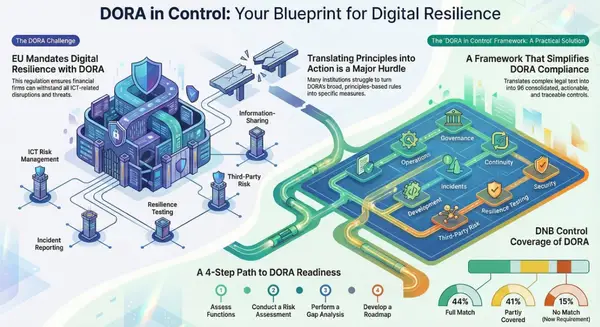Meta's $8 Billion Privacy Settlement: Key Compliance Lessons for Modern Organizations

The recent $8 billion settlement between Meta Platforms shareholders and CEO Mark Zuckerberg, along with current and former directors, marks a watershed moment in corporate privacy compliance. This landmark resolution offers critical insights for organizations navigating the complex intersection of data privacy, corporate governance, and regulatory compliance in today's digital landscape.
Executive Summary
Meta's leadership agreed to settle shareholder claims seeking $8 billion in damages allegedly caused by repeated violations of Facebook users' privacy rights. The settlement, reached just as the trial was beginning in Delaware court, stems from the Cambridge Analytica scandal and subsequent regulatory actions, including a record-breaking $5 billion Federal Trade Commission penalty.

Background: The Cambridge Analytica Catalyst
The Cambridge Analytica scandal exposed how the personal information of up to 87 million Facebook users was improperly shared with a political consulting firm. This breach violated a 2012 consent agreement with the Federal Trade Commission, triggering a cascade of regulatory actions, user lawsuits, and shareholder litigation that culminated in this historic settlement.
The scandal revealed fundamental weaknesses in Meta's data governance framework and highlighted the far-reaching consequences of privacy compliance failures. For compliance professionals, this case demonstrates how privacy violations can evolve from regulatory issues into existential corporate governance challenges.
The Corporate Governance Dimension
What makes this settlement particularly significant is its focus on corporate governance rather than direct user harm. Shareholders argued that Meta's executives and board members breached their fiduciary duties by allowing privacy violations that resulted in massive financial penalties and reputational damage to the company.
The lawsuit specifically alleged that Facebook executives intentionally violated their FTC agreement by sharing user data with third-party applications without proper user consent. This framing transforms privacy compliance from a regulatory requirement into a core corporate governance responsibility.
Regulatory Consequences and Compliance Failures
The Cambridge Analytica incident triggered multiple regulatory responses that organizations should study:
Federal Trade Commission Action: Meta paid a record-breaking $5 billion penalty and agreed to implement comprehensive compliance measures that fundamentally changed how the company approaches user privacy. The settlement included requirements for enhanced oversight, regular compliance assessments, and executive accountability measures.
Global Regulatory Response: The incident occurred as global privacy regulations were strengthening, with GDPR implementation in Europe and similar laws emerging worldwide. Meta's compliance failures provided regulators with a high-profile case study in privacy enforcement.
Ongoing Compliance Obligations: The FTC settlement imposed robust, ongoing compliance measures that require continuous monitoring and reporting. These obligations demonstrate how privacy violations can create long-term operational constraints and costs.

Key Compliance Lessons
1. Executive Accountability is Real
The settlement underscores that privacy compliance failures can create personal liability for executives and board members. Modern privacy regulations increasingly include personal accountability provisions, and this case shows how shareholders can pursue remedies when leadership failures result in regulatory penalties.
2. Governance Systems Must Match Risk Exposure
Organizations handling large volumes of personal data need governance systems commensurate with their risk exposure. Meta's case demonstrates that traditional corporate governance structures may be inadequate for companies with significant privacy obligations.
3. Consent Agreements Create Ongoing Obligations
The violation of Meta's 2012 FTC consent agreement was central to the regulatory action. Organizations subject to consent agreements must implement robust compliance monitoring to ensure ongoing adherence to negotiated terms.
4. Data Sharing Requires Rigorous Controls
The core issue involved third-party data sharing without adequate user consent. Organizations must implement comprehensive controls around data sharing, particularly with external partners and service providers.
5. Compliance Costs Extend Beyond Penalties
While the $5 billion FTC penalty was substantial, the total cost of compliance failure included legal fees, settlement payments, operational changes, and reputational damage. The $8 billion shareholder settlement represents additional consequences beyond direct regulatory penalties.

Best Practices for Privacy Compliance
Implement Executive Oversight
Establish clear executive accountability for privacy compliance, including regular board reporting and personal certifications. Consider creating dedicated privacy roles with direct board access.
Develop Comprehensive Data Governance
Create robust data governance frameworks that address data collection, processing, sharing, and retention. Ensure these frameworks align with all applicable regulatory requirements.
Enhance Third-Party Risk Management
Implement rigorous due diligence and ongoing monitoring for third-party data sharing relationships. Establish clear contractual requirements and regular compliance assessments.
Invest in Compliance Technology
Deploy technology solutions that provide real-time visibility into data processing activities and automated compliance monitoring. Consider privacy-by-design principles in system development.
Conduct Regular Risk Assessments
Perform comprehensive privacy risk assessments that consider both regulatory requirements and business objectives. Update assessments regularly as regulations and business practices evolve.
Regulatory Landscape Evolution
The Meta settlement occurs against a backdrop of rapidly evolving privacy regulations worldwide. Key developments include:
- Strengthened enforcement by the Federal Trade Commission and state regulators
- Implementation of comprehensive state privacy laws in California, Virginia, and other states
- Continued evolution of GDPR enforcement in Europe
- Emerging artificial intelligence governance requirements
Organizations must adapt their compliance programs to address this evolving regulatory landscape while learning from high-profile enforcement actions like Meta's experience.

Strategic Implications for Organizations
Risk Assessment and Mitigation
Organizations should conduct comprehensive assessments of their privacy compliance posture, considering both regulatory requirements and potential shareholder litigation risks. This includes evaluating executive accountability measures and board oversight structures.
Investment in Compliance Infrastructure
The long-term costs of compliance failure often exceed the investment required for robust compliance programs. Organizations should view privacy compliance as a strategic investment rather than a cost center.

Stakeholder Communication
Effective privacy compliance requires clear communication with multiple stakeholders, including customers, employees, regulators, and investors. Organizations should develop comprehensive communication strategies that address privacy practices and compliance commitments.
Future Considerations
The Meta settlement likely signals increased scrutiny of privacy compliance at the highest levels of corporate governance. Organizations should expect:
- Enhanced regulatory focus on executive accountability
- Increased shareholder activism around privacy compliance
- Greater integration of privacy considerations into corporate governance frameworks
- Continued evolution of personal liability for privacy violations

Conclusion
Meta's $8 billion privacy settlement represents more than a financial resolution—it establishes new precedents for executive accountability in privacy compliance. The case demonstrates that privacy violations can create cascading consequences affecting regulatory relationships, customer trust, and shareholder value.
For compliance professionals, this settlement underscores the critical importance of robust privacy governance frameworks that address not only regulatory requirements but also corporate governance responsibilities. Organizations that proactively invest in comprehensive privacy compliance programs position themselves to avoid the costly consequences experienced by Meta while building sustainable competitive advantages in an increasingly privacy-conscious marketplace.
The lessons from Meta's experience should inform strategic privacy compliance initiatives across all industries, emphasizing the need for executive engagement, comprehensive governance structures, and ongoing investment in privacy protection capabilities.
This article provides general information about privacy compliance developments and should not be considered legal advice. Organizations should consult with qualified legal counsel for specific compliance guidance.











